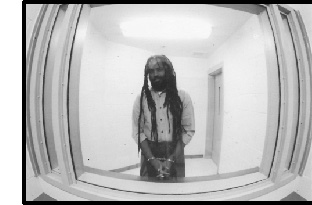
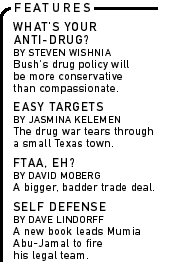
|
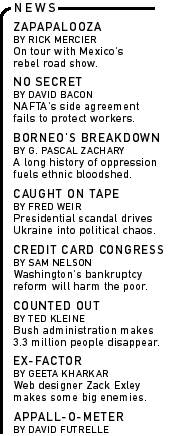
|
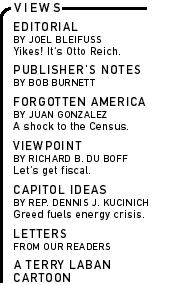
|
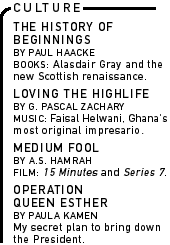
|
| |
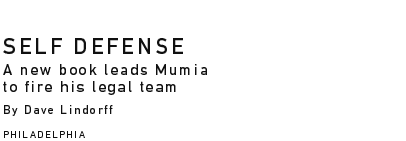 |
|
|
Mumia Abu-Jamal, the black journalist and former Black Panther who has spent the past 19 years on Pennsylvania's Death Row for the murder of a white cop, has fired his legal defense team in response to the pending publication of a book authored by one of his key attorneys. Abu-Jamal made the dramatic move on March 1 in a handwritten request filed with Federal District Judge William H. Yohn Jr., who is currently considering Abu-Jamal's last-ditch habeas corpus appeal of his state court murder conviction. In that brief he says he needs to drop his attorneys because the book, Executing Justice: An Inside Account of the Case of Mumia Abu-Jamal (St. Martin's Press), represents a breach of legal ethics and of lawyer-client confidentiality by attorney Dan Williams. Abu-Jamal doesn't explain his reasons for wanting to toss out lead counsel Leonard
Williams, a death penalty appeals expert, expresses regret at being dropped from the case, which he has been involved in since 1994, and claims that Abu-Jamal knew for months of his plans to write a book. "I provided to Mumia, through his agent, a detailed synopsis of each chapter before I wrote the book," he says. He further insists that there has been no violation of ethics and no breach of confidence with his client, saying, "Everything in this book was already on the public record." He explains that the arguments among defense attorneys, and the broader disputes over legal strategy that are reported in detail in the book, all occurred in the presence of other people--usually members of the Abu-Jamal support network--or were previously published. "There is nothing in this book that violates legal ethics," insists Williams, who says he continues to believe that Abu-Jamal is "innocent and, most importantly, has never been given a meaningful opportunity to refute the prosecution's flawed case against him." The book itself, at more than 300 pages, provides the most detailed analysis of this complex case to date, and invites controversy by charging both the prosecution and some Mumia backers alike with overstating and misrepresenting their cases. Williams retraces the original 1982 trial, in which a jury of two blacks and 10 whites convicted Abu-Jamal of first-degree murder and sentenced him to death. He then reviews the subsequent Post-Conviction Relief Act (PCRA) rehearing of the facts in the case, where serious questions were raised about the reliability and honesty of earlier prosecution witnesses (as well as new evidence that the prosecution withheld from the defense). He argues that there are sound reasons to suspect that Abu-Jamal did not fire the first shot back in 1981--a key part of the prosecution's successful portrayal of this as a first-degree murder case. Instead, Williams argues that the evidence suggests officer Daniel Faulkner shot Abu-Jamal in the chest first, before being shot fatally himself--a scenario which would open the door to a self-defense argument. Williams' theory, based on eyewitness testimony, has someone else firing the fatal shot that killed the officer. But he seems to suggest that this is less important than proving that Abu-Jamal was not the cold-blooded assassin the prosecution made him out to be at trial, and getting him off of Death Row. (His view is that it would be much easier to overturn Abu-Jamal's death sentence, and even his first-degree murder conviction, than to have him declared innocent.) Williams goes on to charge that, in promoting the theory of a grand conspiracy to kill Abu-Jamal, some of Abu-Jamal's supporters--including MOVE and lawyers from the Trotskyist Partisan Defense Committee (PDC)--are more interested in "exploiting" his case for political ends than in overturning his death sentence. Those conspiracy advocates, who have seen the hand of everything from the FBI to Abu-Jamal's original attorney Anthony Jackson behind his conviction, undercut the strength of his case, Williams argues. Weinglass and he struggled behind the scenes to keep several witnesses promoted by PDC attorneys Rachel Wolkenstein and Jon Piper off the stand during the PCRA hearing, fearing that their testimony was unbelievable and would tarnish other more credible witnesses. Those witnesses ended up testifying, only to be easily dismantled under the withering cross examination of prosecution attorneys who had the support of the openly pro-prosecution Judge Sabo. Later, after the PCRA hearing was over, Williams says Wolkenstein and Piper tried to convince him and Weinglass they had found a new witness who could show that Faulkner had actually been a stoolie for the FBI, which was investigating corruption in the Center City Police District, and that he had been the victim of a police-arranged mob hit designed to look like Abu-Jamal's doing. Recalling a meeting at Weinglass' loft where this witness was first discussed, Williams says he was "enraged, convinced that bona fide lunacy had set in." Staying behind to talk with Weinglass after the session, he asked his one-time mentor, "Are you seriously considering this?" When Weinglass and Williams rejected the witness and did not include the mob-hit story in their habeas corpus appeal, Williams says the two PDC lawyers quit the case in protest. (In These Times' efforts to talk with Wolkenstein and Piper about their departure from the case were unsuccessful.) Explaining his reasons for going public with such controversial material, just as Abu-Jamal is awaiting word on his critical habeas appeal, Williams says he was driven to write the book to prevent the case from drifting again in what he is convinced is the wrong direction. "This case had and still has the promise and potential to be a powerful referendum on what is wrong with capital punishment and the criminal justice system," he says bitterly. "But it hasn't lived up to that potential because a small fringe element has taken control over the movement, and that has resulted in Mumia's case being, in many people's view, an oddity on the fringe of the extreme left-wing of our society. In essence it's been marginalized." Weinglass, who says he first saw the manuscript of Executing Justice on February 20, and who notified Abu-Jamal of it on February 22 as soon as he had finished reading it, isn't buying that argument, though. The veteran political attorney, who with William Kunstler defended the Chicago Seven, has harsh words for his erstwhile colleague. "I don't think this book does any legal damage to the case," Weinglass says. "But I do think that it's done political damage to the unity of the support organization. I don't agree with Dan's analysis that Mumia's case has been marginalized, and I don't think that it's the place for a lawyer in a political case to be criticizing and evaluating the value of a support network. He should have shown the manuscript to me and to Mumia before he sent it to the publisher." Others in the "Free Mumia" movement, which in recent years has become a global affair, are even harsher in criticizing Williams. "We think it was a serious mistake for Dan Williams to publish such a book, even if written with the best of intentions, without consulting Mumia," says a statement released by the executive committee of Refuse and Resist!, a New York-based organization that has helped organize international support for Abu-Jamal. "Dan Williams was absolutely wrong in writing that book," says Pam Africa, a spokeswoman for MOVE. As to the decision by Abu-Jamal to dump Weinglass and the rest of the legal team as well as Williams over the book, Africa says, "We support what Mumia is doing. If he wants the whole team gone, he's the one who's on Death Row." The fiercest attack on Williams comes from the PDC, which in a statement calls his book a "malicious act" and adds, "Even within the loose 'ethics' of the legal profession, publication of such a book by an attorney involved in an active case, much less one in which the client's life hangs in the balance, is an abomination." Although Weinglass has criticized Williams for writing the book, and has made it clear he does not want to be fired as lead attorney, the PDC statement goes on to accuse both Williams and Weinglass of trying to exit the case. "Williams' unconscionable act ... is now serving as a ticket for the two longstanding lead attorneys on the defense team to bail out." "The PDC's suggestion that Len and I were part of some grand conspiracy is symptomatic of what I have been trying to fight against," Williams says. Whatever Abu-Jamal's reasons for getting rid of his legal team, the decision is seen as a risky move by some legal experts. "I think the book is a jewel," says noted defense attorney Martin Garbus. "It answers a lot of questions people have had about this case, and it has convinced me of Mumia's innocence. And the firing of Williams and the defense team is unfortunate. But the firing of Len Weinglass, who had nothing to do with the book, is tragic. Weinglass is one of the best lawyers in the country, and by firing him, Mumia is doing himself a terrible disservice." Meanwhile, advocates of Abu-Jamal's execution, including the Fraternal Order of Police and the slain officer's widow, Maureen Faulkner, have been trying to get mileage out of the discord in pro-Mumia ranks over Williams' book. In a statement last week, Faulkner said Abu-Jamal's decision to fire his attorneys was "making a charade out of the legal process." She called the move "just another in a long line of transparent, offbeat legal ploys employed by a guilty man who hopes to disrupt and prolong the appeals process." "We're optimistic that this is a sign the deck chairs are being rearranged on the Titanic," says Michael Smerconish, a Philadelphia attorney who represents an organization called Justice for Police Officer Daniel Faulkner. It remains possible that Weinglass could stay on as Abu-Jamal's attorney. Aside from the PDC, critics of Williams in the Free Mumia movement at large, and Abu-Jamal himself, have avoided any criticism of Weinglass, who says he remains available. "Of course I'm willing to do anything and everything that's asked of me for Mumia," he says. At this point, it is up to Judge Yohn, an appointee of former President
George Bush, to decide how to respond to Abu-Jamal's request. Dave Lindorff is writing a book about the Abu-Jamal case for Common Courage Press. This article was researched with the help of the Fund for Constitutional Government.
|

